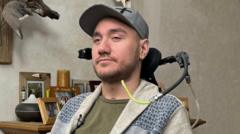Noland Arbaugh's struggle with paralysis takes a transformative turn thanks to Neuralink's brain-computer interface, which raises significant concerns and hopes for the future of neurotechnology.
The Breakthrough of Mind-Control Technology: A New Era for Paralysis Treatment

The Breakthrough of Mind-Control Technology: A New Era for Paralysis Treatment
Noland Arbaugh becomes the first person to receive Neuralink's groundbreaking brain chip, allowing him to control computers with thoughts.
In an era where science fiction often flirts with reality, Noland Arbaugh embodies that intersection. In January 2024, the 30-year-old became the first recipient of a brain chip from Neuralink, a neurotechnology firm founded by Elon Musk. This device can interpret thoughts and translate them into digital commands, marking a pivotal moment for those grappling with disabilities.
Noland's journey began with a diving accident in 2016 that left him paralyzed below the shoulders. He feared losing his independence and the simple joys of life, such as playing video games. "You have to learn that you have to rely on other people for everything," he admitted, reflecting on his previous challenges. The chip, referred to as a brain-computer interface (BCI), is designed to restore some independence. It detects electrical impulses generated by thought and translates them into cursor movements on a computer screen.
Though several companies have ventured into this technology, Neuralink stands out because of Musk's notable presence, drawing both investor interest and skepticism regarding the procedures’ invasiveness. Noland persistently points out, however, that the emphasis should be on the science rather than Musk. "If it works out, then I could help being a participant of Neuralink," he stated, underscoring his willingness to contribute to scientific understanding, irrespective of the risks.
After successfully undergoing surgery, Noland experienced a moment of disbelief that his thoughts could control a screen. "Honestly, I didn't know what to expect – it sounds so sci-fi," he noted. Yet, within a short period, he found himself successfully playing chess and video games, a triumph considering it felt previously unattainable.
Nonetheless, experts highlight concerns surrounding safety and privacy. "If we are exporting our brain activity, we are allowing access to not just what we do but potentially what we think," warned Anil Seth, a neuroscientist from the University of Sussex. Such issues are particularly pressing in the landscape of technology and personal data.
Despite these concerns, Noland is optimistic about further applications of the device, envisioning a future where he could control a wheelchair or even a humanoid robot. However, his journey has not been without obstacles; one device connection issue caused him anxiety about losing control entirely. Thankfully, engineers resolved the problem, reminding everyone of the existing challenges within this emerging technology.
As the realm of neurotechnology expands, competitors like Synchron are pioneering less invasive alternatives, indicating that the desire for progress in this field is increasingly urgent. For users like Noland, the six-year study conditions of the Neuralink device limit long-term predictions, yet he maintains hope. "We know so little about the brain, and this is allowing us to learn so much more," he affirmed, emphasizing the vast potential ahead.
In a world that constantly pushes boundaries, Noland's experience serves not just as a testament to technology's promise but also as a precursor to the ethical conversations surrounding mind-control innovations. As humanity stands on the threshold of a neuro-technological renaissance, each step forward may offer a blend of wonder and caution.



















